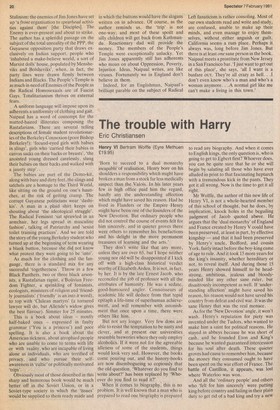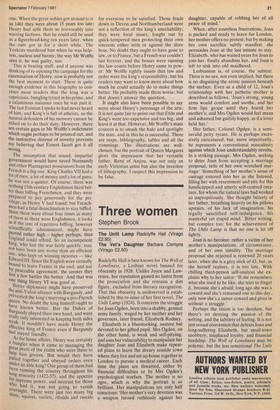The trouble with Harry
Eric Christiansen
Henry VI Bertram Wolffe (Eyre Methuen £19.95) 'Born to succeed to a dual monarchy incapable-of realisation, Henry bore on his shoulders a responsibility which might have broken a man from a stock far less medically suspect than the Valois. In his later years few in high office paid him the regard, hardly any the understanding affection which might have saved his reason. Had he lived in Flanders or the Empire -Henry might have been one of the founders of the New Devotion. But ordinary people who did not control the course of events felt for him sincerely, and in quieter groves there were others to remember his benefactions and his delight in the more permanent treasures of learning and the arts.'
They don't write like that any more, unless they are over 65, but I hope neither young nor old will be disappointed if I kick off with a high-class historical verdict worthy of Elizabeth Arden. It is' not, in fact, by her. It is by the late Ernest Jacob, who reconciled the job of professor with all the attributes of humanity. He was a sedate, good-humoured angler. Connoisseurs of academic life will deduce from that tepid epitaph a life-time of superhuman achievement, and will remember with astonishment that once upon a time, there were others like him.
But not any longer. Very few dons are able to resist the temptation to be nasty and clever, and at present our universities resemble breweries where they only employ alcoholics. If it were not for the agreeable idleness of some of the students, things would look very sad. However, the books come pouring out, and the history-books are now disembogueing so copiously that the old question, 'Whatever do you find to write about?' has been replaced by 'Whoever do you find to read it?'
When it comes to biography, this is no problem. It is well known that a man who is prepared to read one biography is prepared to read any biography. And when it comes to English kings, the only question is, who is going to get to Egbert first? Whoever does, you can be quite sure that he or she will begin by saluting all those who have ever alluded in print to that fascinating heptarch with a tremendous kick in the pants. They got it all wrong. Now is the time to get it all right.
Mr Wolffe, the author of this new life of Henry VI, is not a whole-hearted member of this school of thought, but he does, by implication, knock holes in the beguiling judgment of Jacob quoted above. He argues that the 'dual monarchy' of England and France created by Henry V could have been preserved, at least in part, by effective kingship — and that it had been preserved by Henry's uncle, Bedford, and cousin York, fairly intact before the boy-king came of age to rule. And it took 15 more years for the king's insanity, whether hereditary or not, to reveal itself. And during those 15 years Henry showed himself to be headstrong, ambitious, jealous and bloodyminded like any other sane ruler, but disastrously incompetent as well. If 'understanding affection' might have saved his reason, his reason would not have saved his country from defeat and civil war. It was the sane Henry that was the real menace.
As for the 'New Devotion' angle, it won't wash. Henry's reputation for piety was invented under the Tudors, who wanted to make him a saint for political reasons. He stayed in abbeys because he was short of cash, and he founded Eton and King's because he wanted guaranteed intercession for his soul after death. These quieter groves had cause to remember him, because the money they consumed ought to have been spent on the war effort of France. The battle of Castillon, it appears, was lost where Waterloo was won.
And all the 'ordinary people' and others who 'felt for him sincerely' were putting king before country and failing in their plain duty to get rid of a bad king and try a new one. When the great nobles got around to it in 1461 they were about 15 years too late; Henry had split them so irrevocably into warring factions, that he could still be used as a figurehead-king ten years later, when the outs got in for a short while. The Yorkists murdered him when he was helpless, useless and barmy; the way Mr Wolffe sees it, he was guilty, too.
This is bracing stuff, and if anyone was thinking of re-opening the campaign for the canonisation of Henry, now is probably not the best moment to start. There is quite enough evidence in this biography to conOnce most readers that the king was a capricious, bungling tyrant in his prime, and a calamitous nuisance once he was past it. The last Etonian I spoke to had never heard of him, and King's is full of atheists, so the natural defenders of his memory cannot be relied on to do their duty. However, there are certain gaps in Mr Wolffe's indictment Which ought perhaps to be pointed out, and the instinctive distrust of novelty prevents my believing that Ernest Jacob got it all wrong.
The assumption that sound. impartial government would have saved Normandy and other Plantagenet possessions from the French is a big one. King Charles VII had a lot of men, a lot of money and a lot of guns; he was not a quitter. Of course, there was nothing 15th-century Englishmen liked better than biffing Frenchmen, and they were • Prepared to pay generously for the privilege, as Henry V had found; but Frenchmen had a fatal disinclination to stay biffed. Since there were about four times as many of them as there were Englishmen, it looks as if the cost of repetitive biffing, however scientifically administered, might have Proved rather high – higher perhaps, than England could afford. So an incompetent king, who lost the war fairly quickly, may not have been any worse than an efficient one, who kept on winning victories — like Edward III. Since the English were virtually hound to leave France in the end, and not hY peaceable agreement, the sooner they lost a few battles the better. And that was one thing Henry VI was good at. Better diplomacy might have preserved the anti-Valois alliance with Burgundy, and prevented the king's marrying a pro-French queen. No doubt the king himself ought to have known better. But the Dukes of Burgundy played their own hand, and were really only interested in keeping both sides weak. It wouldn't have made Henry the effective king of France even if Burgundy had stayed friendly. As for home affairs, Henry was certainly a bungler when it came to managing the great peers of the realm who were there to heIP him govern. But would they have Pulled together and obeyed orders even under an able king? One group of them had ,heen running the country throughout his !Ong minority (1422-37), and the appetite tor supreme power, and mistrust for those who had it, was not going to vanish Overnight. There were just too many big shots, squires, varlets, ribalds and rascals for everyone to be satisfied. Those feuds down in Devon and Northumberland were not a reflection of the king's unreliability; they were local issues, fought out by quick-tempered men protecting their own interests either with or against the shire boss. No doubt they ought to have gone to law, or to France, but a French war couldn't last forever, and the bosses were running the law-courts before Henry came to power. Mr Wolffe rightly insists that law and qrder were the king's responsibility; but his readers may want to know more about how much he could actually do to make things better. He probably tnade them worse; but that doesn't answer the question.
It might also have been possible to say more about Henry's patronage of the arts., It is not quite fair to point out that Etcin and King's were too expensive and too big, and leave it at that. HoWever, Mr Wolffe's main concern is to smash the halo and spotlight the man, and in this he is successful. There are maps, bibliography, tables and all the trimmings. The illustrations are wellchosen, but the portrait of Queen Margaret gives the impression that her versatile father, Rend of Anjou, was not only an early Victorian artist but also the inventor of lithography. I suspect this impression to be false.







































 Previous page
Previous page